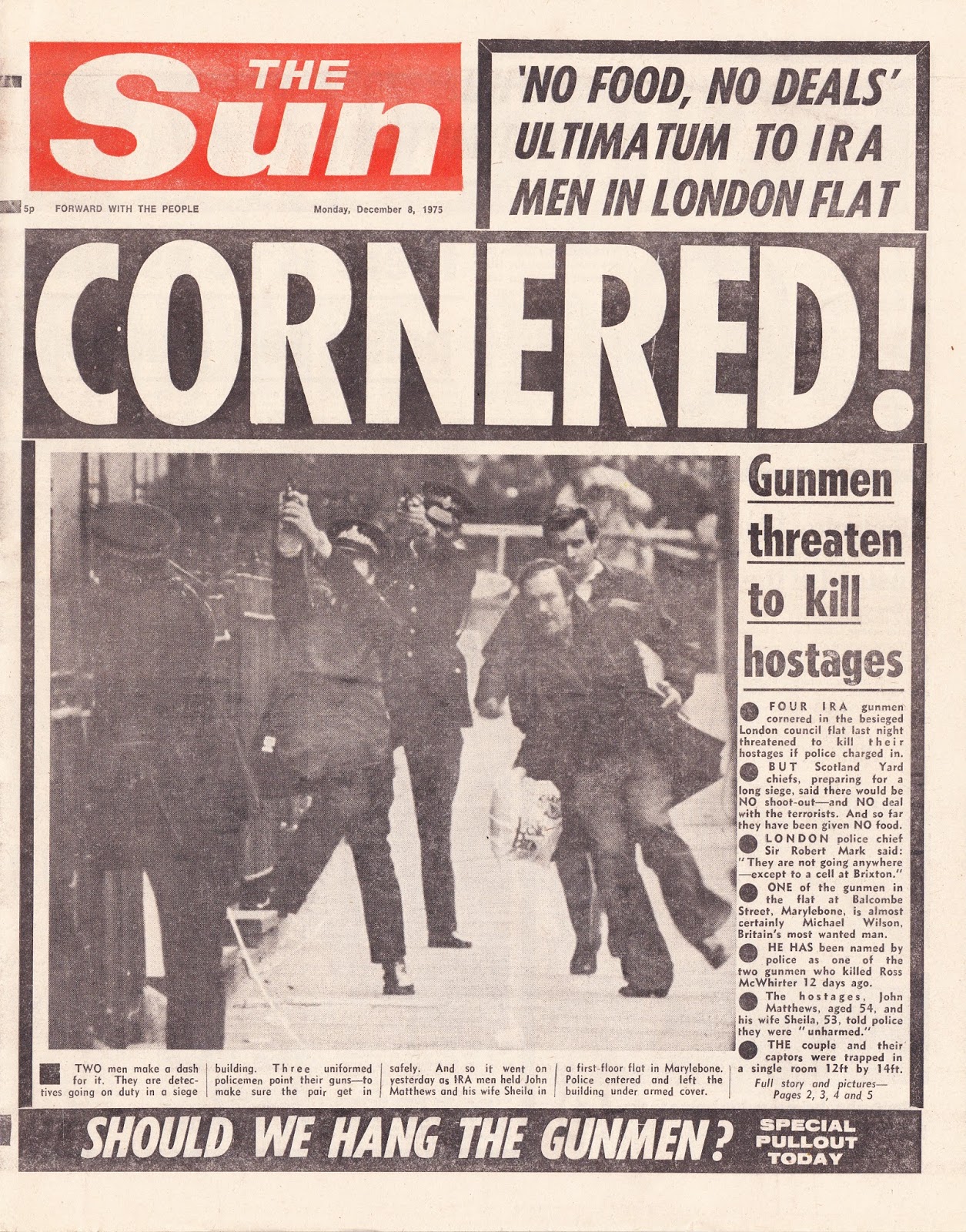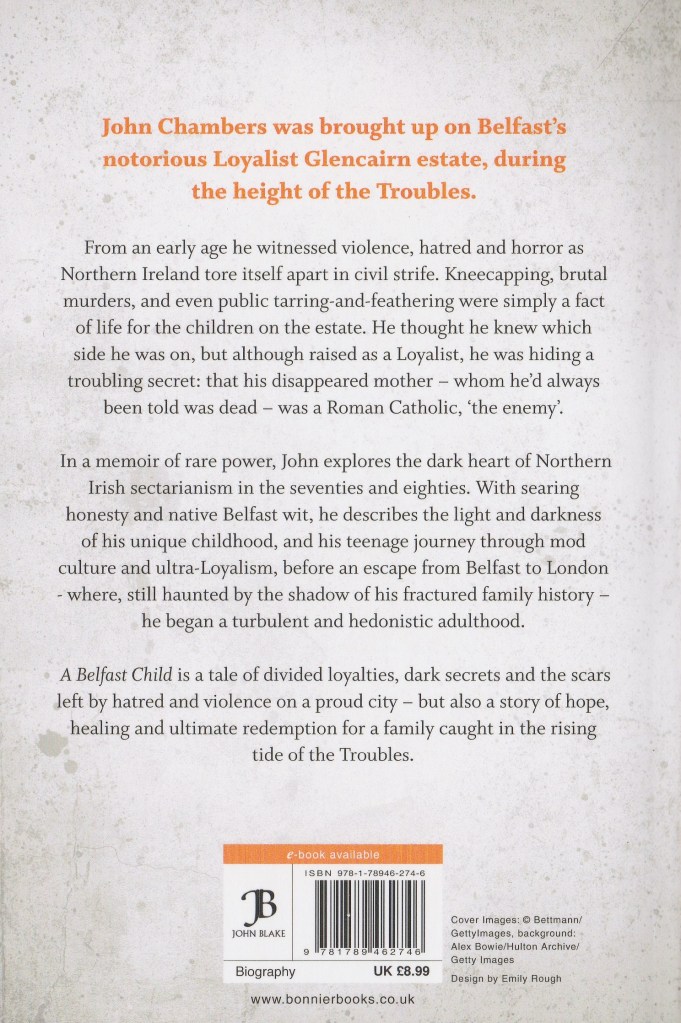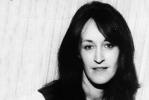Key Events & Deaths on this day in Northern Ireland Troubles
6th December
Monday 6 December 1971
A woman died trying to salvage property from the Salvation Army Citadel in Belfast when a wall fell on her. Earlier there had been a bomb which started a large fire in an ajoining building.

Brian Faulkner, then Northern Ireland Prime Minister, met with Reginald Maudling, then British Home Secretary, in London.
Thursday 6 December 1973

William Craig, then leader of Vanguard, Ian Paisley, then leader of the Democratic Unionist Party (DUP), and Harry West, then leader of the grouping called the Ulster Unionist Assembly Party, held a joint rally in the Ulster Hall and formed the United Ulster Unionist Council (UUUC) to try to oppose power-sharing and to bring down the power-sharing Executive.
The rally was attended by approximately 600 delegates from the Ulster Unionist Party (UUP) constituency associations.
Thursday 6 – Sunday 9 December 1973
Sunningdale Agreement The Civil Service Staff College at Sunningdale in England played host to a conference to try to resolve the remaining difficulties surrounding the setting up of the power-sharing Executive for Northern Ireland.
Sunningdale was the first occasion since 1925 that the Prime Minister of the United Kingdom (UK), the Taoiseach (Irish Prime Minister), and the Northern Ireland government – in the form of the Northern Ireland Executive (designate) – had attended the same talks on the future of Northern Ireland.

Edward Heath, then British Prime Minister, and Liam Cosgrave, then Taoiseach, and senior ministers attended in addition to representatives of the Ulster Unionist Party (UUP), the Social Democratic and Labour Party (SDLP), and the Alliance Party of Northern Ireland (APNI). The participants discussed a number of matters but the main item of concern centred on the unresolved issue of the ‘Irish Dimension’ of any future government of Northern Ireland. Proposals surrounding this ‘Irish Dimension’ were finally to be agreed in the form of a proposed Council of Ireland. The elements of the proposed Council were that it would consist of a Council of Ministers and a Consultative Assembly.
The Council of Ministers was to be comprised of seven members from the Northern Ireland Executive and seven members of the Irish government. This Council would have executive and harmonising functions and a consultative role. The Consultative Assembly was to be made up of 30 members from the Northern Ireland Assembly and the same number from the Dáil. This Assembly was to have advisory and review functions.
[A communiqué was issued on 9 December 1973.]
[ Sunningdale; Ulster Workers’ Council Strike. ]
Saturday 6 December 1975

Balcombe Street Siege British police chased a group of four Irish Republican Army (IRA) men through the West End of London. There was a car chase and an exchange of gunfire before the IRA members took over a council flat in Balcombe Street and held the married couple living in the flat hostage.
[This marked the beginning of a six-day siege during which time the IRA members demanded a plane to take them to the Republic of Ireland. The siege ended when the hostages were released unharmed and the IRA members surrendered to police.]
Two members of the IRA were killed when the land mine they were preparing exploded prematurely near Killeen, County Armagh.
Monday 6 December 1982
Droppin Well bombing

‘Droppin Well’ Bomb The Irish National Liberation Army (INLA) exploded a bomb at the Droppin’ Well Bar and Disco in Ballykelly, County Derry, and killed 17 people (one of whom died ten days after the incident).
The dead included 11 British soldiers and 6 civilians. Approximately 30 people were also injured in the blast some of them seriously. The soldiers, mainly members of the Cheshire Regiment, regularly socialised in the pub which was close to the British Army base in Ballykelly.
[Tomás Ó Fiaich, then Catholic Primate of Ireland, called the killings “gruesome slaughter”.
Margaret Thatcher, then British Prime Minister, said:
“This is one of the most horrifying crimes in Ulster’s tragic history. The slaughter of innocent people is the product of evil and depraved minds, and the act of callous and brutal men.”
Although the bomb was small, believed to be 5lbs or 10lbs of commercial (Frangex) explosives, it had been placed next to a support pillar in the bar and when it exploded the blast brought down the roof. Many of those killed and injured were crushed by fallen masonry. In June 1986 four people recieved life sentences for the attack and a fifth person received a ten year sentence.]
See‘ Droppin Well’ Bomb
Thursday 6 December 1984

Two members of the Irish Republican Army (IRA) were shot dead by undercover British soldiers in the grounds of Gransha Hospital, Derry.
Friday 6 December 1985
The Alliance Party of Northern Ireland (APNI) took the decision to withdraw from the Northern Ireland Assembly.
Friday 6 December 1996
Another Catholic family was forced to leave the mainly Protestant Ballykeel Estate in Ballymena. This followed earlier expulsions on 4 December 1996. Two Catholic schools were also damaged in sectarian attacks in north Antrim.

Ken Maginness, Security Spokesman of the Ulster Unionist Party (UUP), claimed that the Democratic Unionist Party (DUP) was responsible for the sectarian tensions in the Ballymena area. Martin Smyth announced that he was retiring as Grand Master of the Orange Order.
Saturday 6 December 1997
The United Kingdom Unionist Party (UKUP) held its first annual conference in Bangor, County Down. The Irish Republican Socialist Party (IRSP) held its annual conference in Dublin. The party rejected by 109 votes to 11 a motion from the Ard Chomhairle (executive) which called on the Irish National Liberation Army (INLA) to engage in a ceasefire until the end of the multi-party talks at Stormont.
Monday 6 December 1999
In one of its first decisions the Northern Ireland Assembly voted to increase the salaries of Members of the Legislative Assembly (MLAs) by £9,000 to £38,036.
Wednesday 6 December 2000
Gary Moore (30), a Catholic civilian, was shot dead while renovating houses in Devenish Drive, Monkstown, Newtownabbey, County Antrim.
[Loyalist paramilitaries were responsible for the killing but it is not known which group carried out the shooting.]
Several families were evacuated from their homes in the Ballymoney area when a pipe-bomb was discovered on the windowsill of a house. The occupant of the house was not at home at the time of the incident.
Thursday 6 December 2001
A draft report by the Police Ombudsman for Northern Ireland (PONI) into the handling of prior warnings about the Omagh Bombing was leaked to the BBC in Northern Ireland.

[The final report was published on Wednesday 12 December 2001. The contents of the leaked report caused serious friction between Ronnie Flanagan, then Chief Constable of the Police Service of Northern Ireland (PSNI), and Nuala O’Loan, then PONI. John Reid, then Secretary of State for Northern Ireland, criticised the leaking of the report and said media speculation was damaging. Ken Maginnis, formerly Ulster Unionist Party spokesman on security, said the Ombudsman had walked through “police interests and community interests like a suicide bomber”. Later Jimmy Spratt, then Chairman of the Police Federation, criticised Nuala O’Loan and called on her to resign. However, David Cook, formerly Chairman of the Northern Ireland Police Authority, said Mr Spratt should be the one to go.]

Gerry Adams, then President of Sinn Féin (SF), held a media briefing in Belfast at which he called on the British government to establish an International Public Judicial Inquiry into the killing of Pat Finucane, a Belfast solicitor killed on 12 February 1989.
The call followed the collapse of the case against William Stobie on 26 November 2001 and also the continuing alleged links between the British security forces and Loyalist paramilitaries. Colin Powell, then Secretary of State in the USA, designated as ‘terrorist’ three groups based in Northern Ireland by listing them in the Terrorist Exclusion List.

The groups were: the Continuity Irish Republican Army (CIRA), the Orange Volunteers (OV), and the Red Hand Defenders (RHD). This designation has the effect of excluding members or supporters from the USA and will also prevent them from collecting funds in the country.
[However, in the middle of 2001 there was speculation that the RHD (and the OV) was being used as a covername (a pseudonym, or ‘flag of convenience’) by members of the LVF and the UDA / UFF under which these organisations could carry out attacks without taking the blame. If this is true then the RHD (and OV) is a non-existent organisation.]
————————–
———————————————————————————
Remembering all innocent victims of the Troubles
Today is the anniversary of the death of the following people killed as a results of the conflict in Northern Ireland
“To live in hearts we leave behind is not to die
– Thomas Campbell
To the innocent on the list – Your memory will live forever
– To the Paramilitaries –
There are many things worth living for, a few things worth dying for, but nothing worth killing for.
25 People lost their lives on the 6th December between 1971 – 2000
————————————————————
06 December 1971
Mary Thompson, (61)
Protestant
Status: Civilian (Civ),
Killed by: Irish Republican Army (IRA)
Killed by wall collapsing onto her, shortly after bomb attack on building next door, Salvation Army Citadel, Dublin Road, Belfast.
————————————————————
06 December 1972
Samuel White, (32)
Protestant
Status: Civilian (Civ),
Killed by: non-specific Republican group (REP)
Found shot, Lisbon Street, Short Strand, Belfast.
————————————————————
06 December 1974
James Davidson, (64)
Protestant
Status: Civilian (Civ),
Killed by: non-specific Loyalist group (LOY)
Died two days after being shot during robbery at his shop, Upper Glenfarne Street, Shankill, Belfast.
————————————————————
06 December 1975

James Lochrie, (19)
Catholic
Status: Irish Republican Army (IRA),
Killed by: Irish Republican Army (IRA)
Killed when land mine exploded prematurely, Kelly’s Road, Killeen, County Armagh
————————————————————
06 December 1975

Sean Campbell, (20)
Catholic
Status: Irish Republican Army (IRA), K
illed by: Irish Republican Army (IRA)
Killed when land mine exploded prematurely, Kelly’s Road, Killeen, County Armagh.
—————————————–
06 December 1982

Stephen Smith, (24)
nfNI
Status: British Army (BA),
Killed by: Irish National Liberation Army (INLA)
Off duty. Killed by time bomb left in disco at Droppin Well Bar, Ballykelly, County Derry.
—————————————–
06 December 1982
Philip McDonough, (26)
nfNI
Status: British Army (BA),
Killed by: Irish National Liberation Army (INLA)
Off duty. Killed by time bomb left in disco at Droppin Well Bar, Ballykelly, County Derry.
—————————————–
06 December 1982
Steven Bagshaw, (21)
nfNI
Status: British Army (BA),
Killed by: Irish National Liberation Army (INLA)
Off duty. Killed by time bomb left in disco at Droppin Well Bar, Ballykelly, County Derry
—————————————–
06 December 1982

Clinton Collins, (20)
nfNI
Status: British Army (BA),
Killed by: Irish National Liberation Army (INLA)
Off duty. Killed by time bomb left in disco at Droppin Well Bar, Ballykelly, County Derry.
—————————————–
06 December 1982
David Murray, (18)
nfNI
Status: British Army (BA),
Killed by: Irish National Liberation Army (INLA)
Off duty. Killed by time bomb left in disco at Droppin Well Bar, Ballykelly, County Derry.
—————————————–
06 December 1982
David Stitt, (27)
nfNI
Status: British Army (BA),
Killed by: Irish National Liberation Army (INLA)
Off duty. Killed by time bomb left in disco at Droppin Well Bar, Ballykelly, County Derry.
—————————————–
06 December 1982
Shaw Williamson, (20)
nfNI
Status: British Army (BA),
Killed by: Irish National Liberation Army (INLA)
Off duty. Killed by time bomb left in disco at Droppin Well Bar, Ballykelly, County Derry.
—————————————–
06 December 1982
Terence Adams, (20)
nfNI
Status: British Army (BA),
Killed by: Irish National Liberation Army (INLA)
Off duty. Killed by time bomb left in disco at Droppin Well Bar, Ballykelly, County Derry.
—————————————–
06 December 1982
Neil Williams, (18)
nfNI
Status: British Army (BA),
Killed by: Irish National Liberation Army (INLA)
Off duty. Killed by time bomb left in disco at Droppin Well Bar, Ballykelly, County Derry
—————————————–
06 December 1982
Paul Delaney, (18)
nfNI
Status: British Army (BA),
Killed by: Irish National Liberation Army (INLA)
Off duty. Killed by time bomb left in disco at Droppin Well Bar, Ballykelly, County Derry.
—————————————–
06 December 1982

David Salthouse, (23)
nfNI
Status: British Army (BA),
Killed by: Irish National Liberation Army (INLA)
Off duty. Killed by time bomb left in disco at Droppin Well Bar, Ballykelly, County Derry.
—————————————–
06 December 1982

Ruth Dixon, (17)
Protestant
Status: Civilian (Civ),
Killed by: Irish National Liberation Army (INLA)
Killed by time bomb left in disco at Droppin Well Bar, Ballykelly, County Derry.
—————————————–
06 December 1982

Carol Watts, (25)
Protestant
Status: Civilian (Civ),
Killed by: Irish National Liberation Army (INLA)
Killed by time bomb left in disco at Droppin Well Bar, Ballykelly, County Derry.
—————————————–
06 December 1982
Angela Hoole, (19)
nfNI
Status: Civilian (Civ),
Killed by: Irish National Liberation Army (INLA)
English visitor. Killed by time bomb left in disco at Droppin Well Bar, Ballykelly, County Derry
—————————————–
06 December 1982
Patricia Cooke, (21)
Catholic
Status: Civilian (Civ),
Killed by: Irish National Liberation Army (INLA)
Injured by time bomb left in disco at Droppin Well Bar, Ballykelly, County Derry. She died 16 December 1982.
—————————————–
06 December 1982
Valerie McIntyre, (21)
Protestant
Status: Civilian (Civ),
Killed by: Irish National Liberation Army (INLA)
Killed by time bomb left in disco at Droppin Well Bar, Ballykelly, County Derry.
—————————————–
06 December 1982

Alan Callaghan, (17)
Protestant
Status: Civilian (Civ),
Killed by: Irish National Liberation Army (INLA)
Killed by time bomb left in disco at Droppin Well Bar, Ballykelly, County Derry.
—————————————–
06 December 1984

William Fleming, (19)
Catholic
Status: Irish Republican Army (IRA),
Killed by: British Army (BA)
Shot by undercover British Army (BA) members while travelling on motorcycle in the grounds of Gransha Hospital, off Clooney Road, Derry.
—————————————–
06 December 1984

Daniel Doherty, (23)
Catholic
Status: Irish Republican Army (IRA),
Killed by: British Army (BA)
Shot by undercover British Army (BA) members, while travelling on motorcycle in the grounds of Gransha Hospital, off Clooney Road, Derry.
—————————————–
06 December 2000

Gary Moore, (30)
Catholic
Status: Civilian (Civ),
Killed by: non-specific Loyalist group (LOY)
Shot while renovating houses, Devenish Drive, Monkstown, Newtownabbey, County Antrim.
—————————————–
See: Dolours Price IRA Icon ? Life & Death
Who wants… A signed copy of my No.1 best selling book ? Makes a great Xmas gift for book lovers & those interested in the Troubles & the crazy, mad days my generation lived through.



Click here to order : https://tinyurl.com/2p9b958v
UK orders only – if you live outside the UK email me belfastchildis@googlemail.com and Ill send you a link for ordering outside the UK.

















